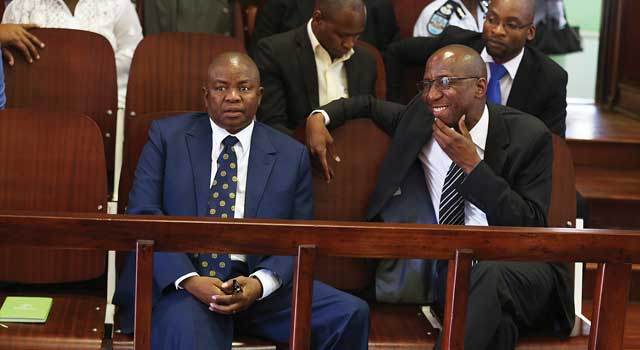The internal audit report commissioned by the Chief Justice (CJ), which is a genesis of the current judicial crisis, may well have been a sophisticated cover-up which has been engineered to target the four judges under suspension.
The judges; Key Dingake, Modiri Letsididi, Mercy Garekwe and Rainer Busang recently lost their case with costs in which they were seeking that the decision to appoint a tribunal to investigate their potential removal from judicial duties be set aside amongst others.
The Special Audit, initiated at the instance of the Chief Justice after the Judicial Conference in Mahalape to investigate the judges who had been receiving housing allowance that they did not deserve as they resided in institutional houses was marred with a lack of specifics.
A close reading of the report shows that the audit had four objectives; to confirm and establish the extent of compliance with laws, rules and regulations as well as policies and procedures, establish whether there is reliability and integrity of recorded information to verify that housing allowances paid to the judges are done correctly by the High court, and establish whether government assets are safeguarded from all losses of all kinds as well as make appropriate recommendations to address the identified anomalies.
Surprisingly, the audit only met one of the objectives. Experts indicate that its methodology was flawed and reveals a possible specific intent of attributing the alleged wrongful conduct only to the four judges; in that it is not clear what the sampling design was and how the judges were picked. Additionally, the report said the audit is ongoing, but strangely, the CJ and the Judicial Service Commission (JSC) decided to report the four Judges to the Police based on an the incomplete report.
More seriously, although the report period of inquiry dates back to 2007, it has inexplicably left out at least one judge, who is in the exact same position as the quartet. It is understood that this particular judge lived in a government pool house from the date of his appointment in 2007, in Francistown, at a subsidized rent of P1, 664.00 per month before his appointment to the bench. Upon being appointed a Judge, the Department of Administration of Justice failed to submit a casualty return to stop the rental payment by him and instead proceeded to pay him housing allowance in the amount of P5, 937.45 for a considerable period of time of which he was not entitled.
These events occurred prior to 2009. When the particular judge bought the same house he had been residing in, in June 2009, he ceased to be entitled to the housing allowance. Attempts to obtain clarification from the Administration of Justice (AoJ) have been met with silence. It has not been established whether the judge has entered into any arrangement to pay back the erroneously made payments of housing allowance to the paying officer and the judge has not been reported to the Police for additional investigation.
The Special Audit specifically provides that it is expected that more information relating to other judges will be revealed in due course. This has not transpired as at the time of going to press.
From the findings of the Special Audit , only the four seem to have been investigated and scheduled to face Police investigations that may adversely impact on their judicial future. The audit which covered records for the financial years 2007/08 to 2015/16 was mandated to look into and analyze copies of salary advice slips, judges personnel files, judges affairs files and judges’ houses files. The report, whilst alluding to not being availed certain information does not indicate what documents were not availed it and by whom. Such documentation would be expected to be in the control of the paying officer, the Registrar. “The information which was availed was incomplete in that there were no dates of occupancy, making it difficult to establish the exact date of occupancy and vacation,” read the report. This information, according to experts, could have been extracted from salary advice slips, had they been availed. Furthermore, the report states that, “Upon reconciliation of available information on allocation of houses and payment of housing allowance, it transpired that some of the judges received housing allowance whilst accommodated in institutional houses. Accordingly, payment of housing allowance was supposed to have been terminated when the judges were allocated institutional houses but it is apparent that no action was taken to effect change.”
The audit was conducted by examining, on test basis, relevant evidence to address issues in question as well as conduct interviews with key personnel, something disputed by the judges in their founding affidavits.
The audit team analyzed a list of houses owned or leased to the AoJ in Gaborone, Francistown and Lobatse, specifically focusing on houses allocated to judges.
The failure by the AoJ to terminate housing allowance was, according to the audit findings, attributed to the internal administrative failure of a non-reconciliation of payroll, in contravention of Financial Procedures Section 115, which requires for monthly reconciliation of salaries to detect any discrepancies. “This state of affairs has exposed Government funds to the possibility of irrevocable loss, considering the amount of payment already incurred,” the audit report states.
Judges Dingake, Busang, Garekwe and Letsididi received P200 467.96, P105 468.73, P123 281.10 and P494 323.40 respectively as housing allowances.
Recommendations of the audit are that casuality returns should be issued to terminate housing for all judges who are not eligible, recovery of housing allowance overpayment paid to Judges who were not eligible should be effected immediately and that management should ensure that monthly reconciliation of salary payments is carried out to detect and prevent payments to non-eligible officers.

